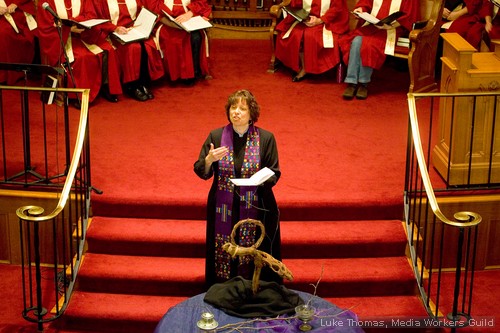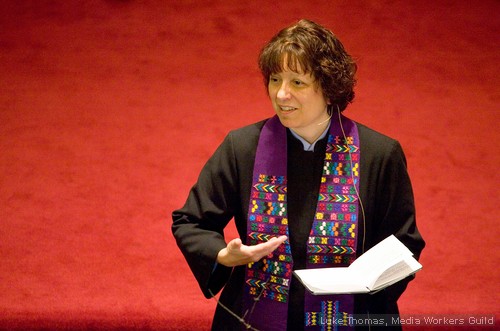
The Rev. Laura Rose of the First Congregational Church of Alameda, like many of her fellow religious leaders, has embraced the Occupy movement. Photos by Luke Thomas for Media Workers Guild.
March 14, 2012
More than 40 years after the Civil Rights movement, religious leaders still have their eyes on the prize.
They are not leading Occupy Wall Street as they did the Civil Rights movement. And if churches served as a vital network for communication and planning during the days of the sit-ins, that role today has been usurped by the Internet – by Facebook and Twitter.
But in sanctuaries and on the streets, faith has both fueled a passionate commitment to the Occupy Wall Street movement and a passionate debate about its methods.
The OWS movement, which protests social and economic inequity and predatory practices that benefit the wealthiest 1 percent at the expense of the rest of society, was kicked off by the Canadian group Adbusters and began in September in the heart of New York City’s financial district. Since then, the movement has been adopted and localized in cities across the nation, some focused on specific issues.
“Occupy movements have a strong religious presence,” said the Rev. Ben Daniel, pastor of Foothill Presbyterian Church in San Jose and a leading progressive thinker and writer. “From a religious perspective, poverty, inequality are important issues. In Gospels, Jesus talks about economic inequality more than anything else. One of the few times Jesus condemns someone it is for failing to feed the poor.”
High profile clergy from across the nation and beyond have weighed in to sanction the movement in varying degrees, including the Archibishop of Canterbury’s robust assertion that Jesus would spend Christmas with Occupy demonstrators at St. Paul’s Cathedral in London, “sharing the risks, not just taking sides.”
All faiths emphasize social justice, said the Rev. Phil Lawson, a veteran of the Civil Rights movement who engaged in his first act of civil disobedience in 1950 at the age of 15.
The Rev. Laura Rose had no plan, no idea what she would say, when she invited parishioners at First Congregational Church of Alameda to stay after services to talk about the then-three week old Occupy movement. Twenty people showed up, impassioned enough to continue an extended conversation that reliably erupts past its scheduled closing time. She described the tenor of the first meeting as “messy and raw, deep and unsettling,” leaving many questions unanswered.
“Religion can become the keeper of the status quo or it can become a liberator,” said Rose, who joined with 13 other religious leaders to create Occupy Oakland’s Interfaith Tent, made up of indigenous elders, Buddhists, Christians, Muslims and Jews. “Jesus’ whole reason for being was to wake people up.”
Five months later, “I don’t think there is a dividing line; that’s the beauty of the idea of the 99 percent,” she mused. “This is a movement that has brought the middle class alongside the working class, the poor. We have to find what divides us and what unites us. It’s what makes this movement expand.”

Rev. Laura Rose.
No social movement in the U.S. has succeeded without the involvement of the faith community, said the Rev. Harold Mayberry, senior pastor of the 2,000-member First AME Church in Oakland.
Lawson goes further: “I do not believe a justice movement can work without a spiritual basis,” he said. “All justice movements arise from a spiritual core, and the concept of justice is found in all faiths.”
It’s all about nonviolence. The goal is to win over the hearts and minds of opponents – perhaps a taller order when the prize is amorphous. Faith leaders, united in a call for peaceful resistance, are presented with a challenge in Oakland, the only Occupy local that has not voted on a pledge of nonviolence.
Rose’s group recently watched the documentary, “A Force More Powerful,” which shows nonviolent resistance ultimately triumphing over threats, torture and killings in Chile, South Africa, and Knoxville, Tenn.
Lawson is showing the film as part of a six-week course in nonviolence at the Church of Religious Science in Oakland. In a recent session, students questioned Lawson’s emphasis on faith, afraid it will alienate some activists.
“There is this resistance from young people – although they are very appreciative of the presence of interfaith people,” Lawson said.
Lawson mesmerized participants in a dialogue called by the American Friends Service Committee (Quakers) between non-violent protesters and those advocating a “diversity of tactics.”
“Nonviolence is not a tactic or a strategy,” he said. “It is a way of life. It is a way of life for the courageous. It always persuades the opponent of the justness of the cause.”
For Lawson, there is a larger problem: Occupy Oakland has failed to consider the city’s faithful – and without them, the movement lacks the authenticity necessary to make lasting change, Lawson said.
“Things are not in close relationship with the community, and any solution has to involve the community. It can’t be done without the community, and it can’t be done on behalf the community. So far, there’s a big disconnect.”
One exception: A fight to get the city to stop investing with Goldman Sachs that began with Allen Temple Baptist Church.
“Oakland in part is a very important venue because it’s more diverse than Occupy in other areas,” Rose said. “Nonviolence does not break down racially. It’s not going to be smooth and easy. There is a very high level of mistrust of police based on a history of abuse.”
Spray painting buildings cannot compare with the destructive power of tear gas canisters hurled into a crowd, as occurred in clashes with police here. A police projectile fractured the skull of Iraq war veteran Scott Olsen, intensifying mistrust and anger, she said.
For those who have not been exposed to Gandhi or King, the Occupy demonstrations have brought teachable moments, said Laura Magnani, Friends interim director. Buddhists brought a persuasive calm to Occupy Oakland by “moving in as a group and meditating.”
In planning talks for the recent Occupy Prisons vigil outside San Quentin, a disparate group agreed to adopt nonviolence. Despite provocations – police blocked off freeway exits and closed the parking lot – “that decision was honored,” Magnani said.
“There are just a lot of people feeling their way,” she said. “We have been using spirit to give voice to these things.”
National faith leaders will gather to discuss the role of faith in the Occupy movement in a public conversation at 7 p.m. Tuesday, March 20 at the Ecumenical Center, Pacific School of Religion, 1798 Scenic Ave., Berkeley.


 The Hunger Site
The Hunger Site
No Comments
Comments for Religious Leaders Show Faith in Occupy Movement are now closed.